Olan Suddeth
Dad. Computer geek.Homebrewer. Disney nut.
Would-be crafty guy.

Amazon
Save Money
Ibotta
Fetch Rewards
(use code "116YB")




I'm a huge fan of beef jerky. I'm not a huge fan of the expense of beef jerky - a tiny bag of it will easily cost more than ten dollars... and will often be rather bland, even so.
Recently, I got the urge to try making my own jerky. I did a little homework, and discovered that it's actually a pretty simple process - and you can cut the price of the finished product in half (or less), with total control over the taste. I've done it successfully a couple of times now; Donna and the kids all really love it. You don't need a dehydrator or any other fancy gear at home, as you can make tasty jerky in your oven. The process I use is a little more complicated than that, but even so, it's easily doable.
My recipe and process will yield spicy, smoky jerky. Feel free to play with the variables to go with whatever flavor profile you would like to achieve!
Olan's Spicy Jerky Marinade
- 1 tbsp. coarse kosher salt
- 1 tbsp. coarse black pepper
- 1/2 tsp. coriander
- 1/2 tsp. garlic powder
- 1/2 tsp. onion powder
- 1/2 tsp. red pepper flakes
- 1 cup water
- OPTIONAL: 1/2 tsp. liquid smoke
Don't use liquid smoke if you plan to add natural flavor via real smoke! Also, please keep in mind that these are approximations only - I tend to be a "dash of this... nah, add a little more" kind of guy in the kitchen, with seasoning blends that vary slightly from batch to batch.
Regardless of the finished flavor you seek, you want to start with VERY lean beef. I know that flank steak will work, but I've been using eye of round roast with great success. For ease of cutting, try tossing the meat in the freezer for an hour or two - this will firm it up and make slicing a LOT easier. I find that cutting against the grain seems to make cutting easier AND gives a little better finished product.
Trim all of the visible, solid fat off of the edges. Fat can make the jerky spoil quicker, so you want to get as much of this off as you can.
Next, slice your meat to thicknesses of 1/8 inch to 1/4 inch. The thicker the meat, the longer it will take to dry. Put your meat into a gallon size Ziploc bag.
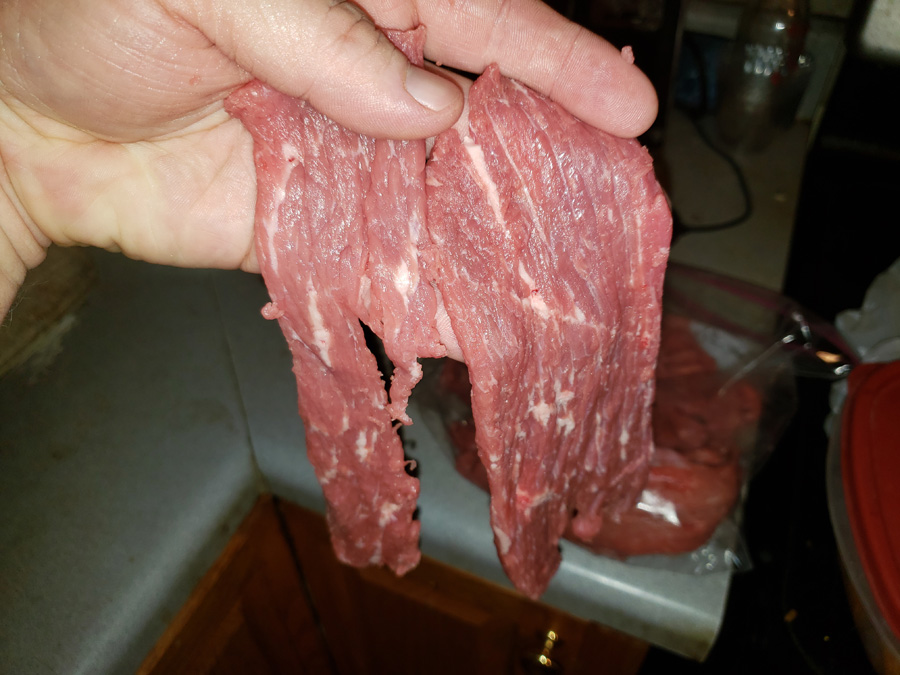
An appropriate thickness for good jerky.
Now, mix up your marinade in a bowl. Stir it well, then pour it over the meat. Squeeze the air out of the bag and seal it, then work the marinade around until you fully coat all meat surfaces.
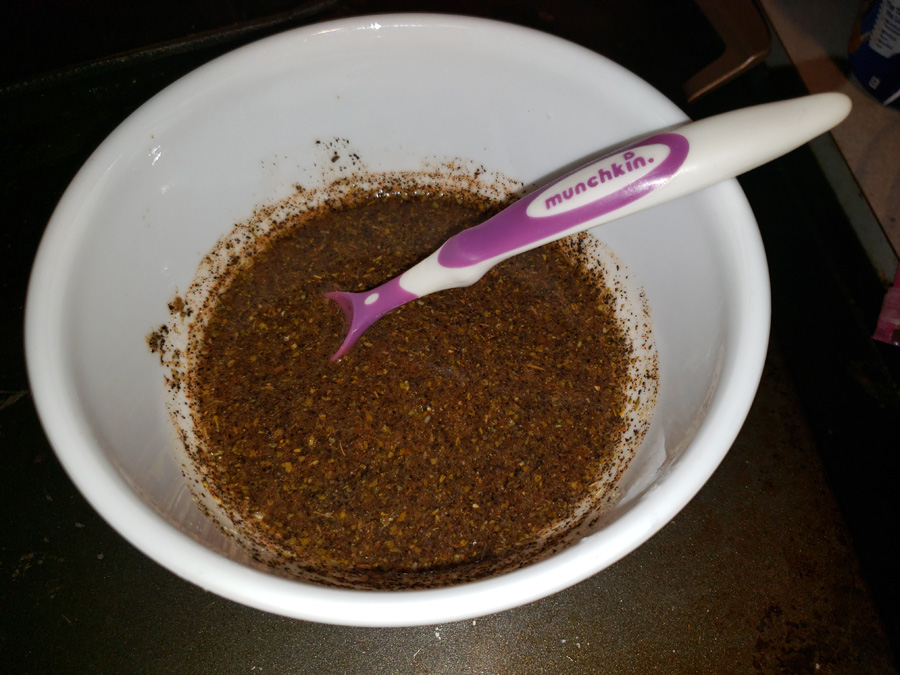
Marinade in a bowl.
Place the bag in the fridge overnight. You may want to turn the bag every so often to ensure that all of your pieces get more or less equal exposure to the marinade.
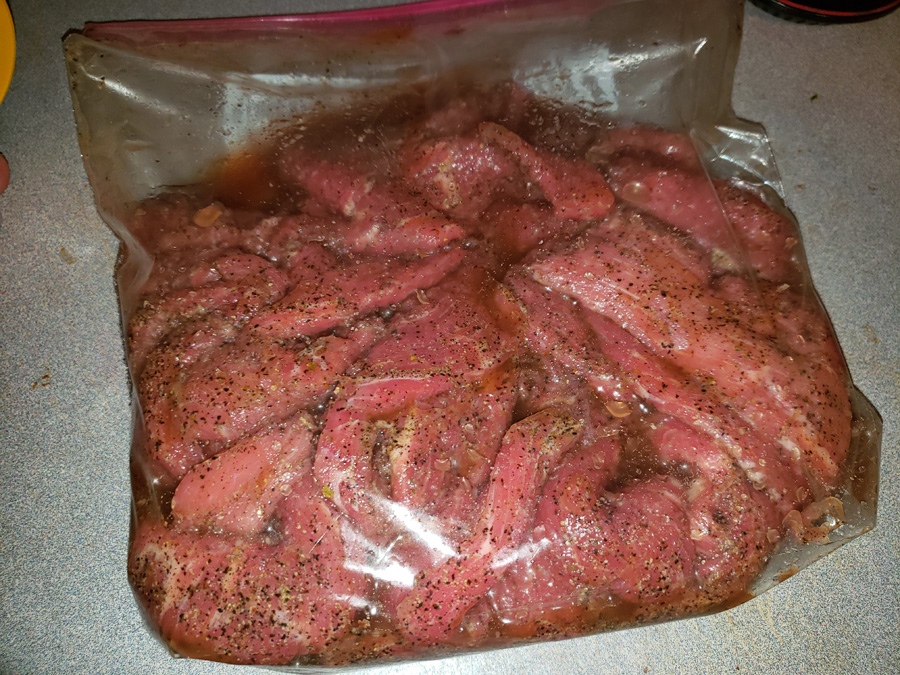
Meat marinating in a baggie.
Prepare your oven by placing aluminum foil over the bottom rack - this will catch the drips and make cleanup a breeze. If you don't do this, your house will be full of smoke! If you like, you can theoretically just lay the jerky directly onto the top oven rack, but this means that you'll have to then clean that rack after you're done... and you have to trust that the rack is already clean enough to place meat on. I personally instead run toothpicks through one end of each strip of jerky, then hang them from the rack. You'll want to pull the rack out of the oven to do this BEFORE you preheat the oven; you don't want to deal with a hot rack, nor do you want to preheat the oven with the jerky in it.
When the time comes to actually dry the jerky, preheat your oven to 300 degrees F. If you intend to add actual smoke to the jerky like I do, you'll want to go ahead and start up your charcoal now. I dearly love my charcoal chimney starter for this; I go with about a half chimney of charcoal briquettes. Once your oven hits 300 degrees, place the jerky into the oven for 8-10 minutes. The idea here is to get the meat's internal temperature to 160 degrees F and kill off any bacteria or the like before you move to the drying process.
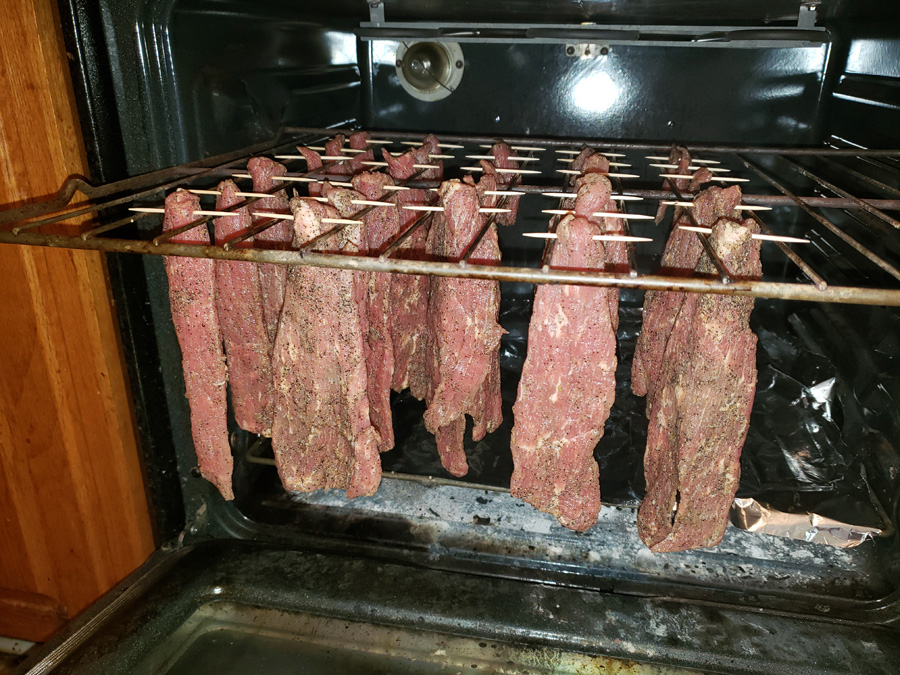
Jerky suspended by toothpicks in the oven from the rack.
At this point, drop the oven's temp as close to 160 degrees F as you can. Odds are, your oven doesn't actually go that low; if not, prop the door open with a wooden spoon.
If you're using liquid smoke in your marinade, skip the next section.
If you're like me and prefer real smoke, you need to add your coals to the grill now. If you have an offset firebox or the like, all the better - you don't want to actually cook the jerky now, you just want to smoke it. If you don't have an offset, do your best to situate your coals to avoid direct heat to the meat. Add your wood (I prefer hickory); chunks are better than chips in that you won't have to replenish them as often. Keep that smoke going; if you're not going to do that, you may as well dry it in the oven!
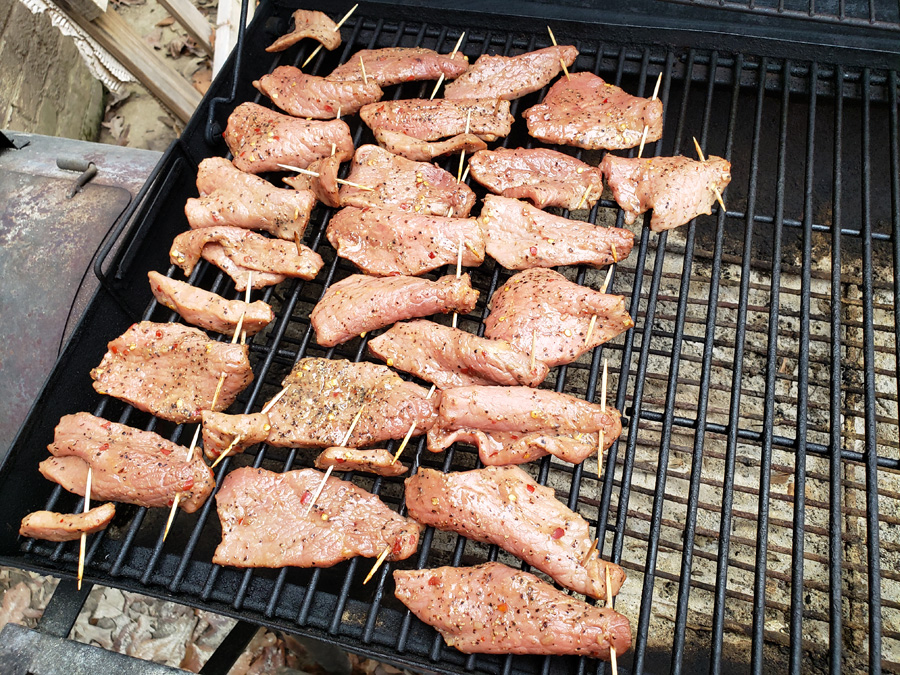
Jerky on the grill, ready for smoking.
I personally smoke my jerky for about two hours, rotating my pieces around the grill to ensure that they all get an even application of smoke and the magical flavor it imparts. You get a nice visual cue here, as the meat will turn a dark reddish color as it absorbs the smoke (as opposed to the lighter brown it is when it's first cooked in the oven). When this is achieved, move the meat back to your oven.
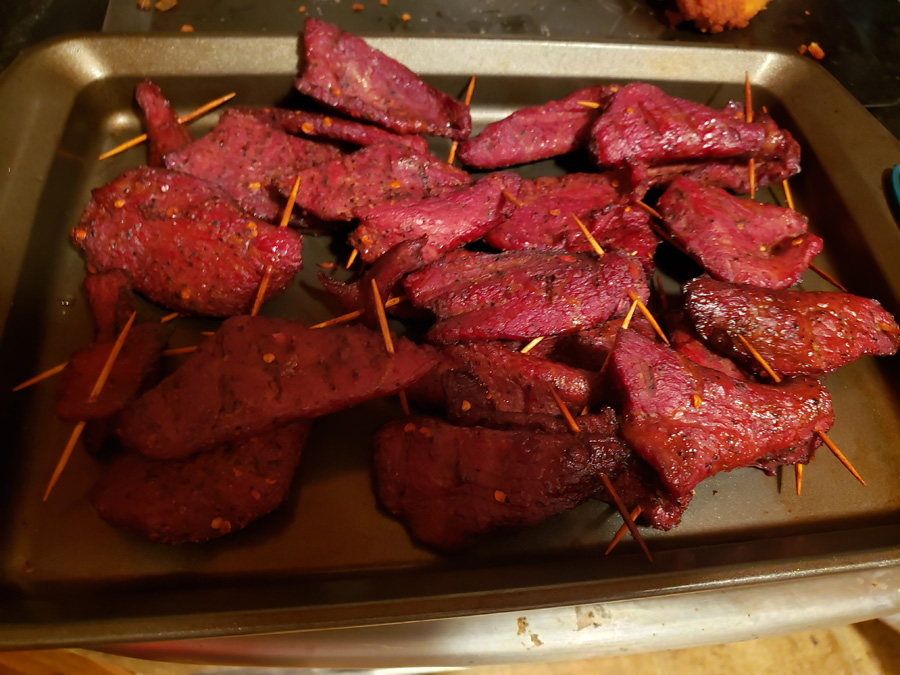
Note the reddish color, showing us that the jerky has been well smoked.
Regardless of how you got your smoke flavor, you will now dry the meat for at least a couple more hours - and this stage can easily take five hours or more. The big variable here is how thick your slices are; the thicker your cuts, the longer it will take to dry.
The jerky will continue to darken as it dries. The ideal goal here is that a piece that you've taken from the oven and allowed to cool for five or so minutes will crack when you bend it in half - but it won't break into pieces.
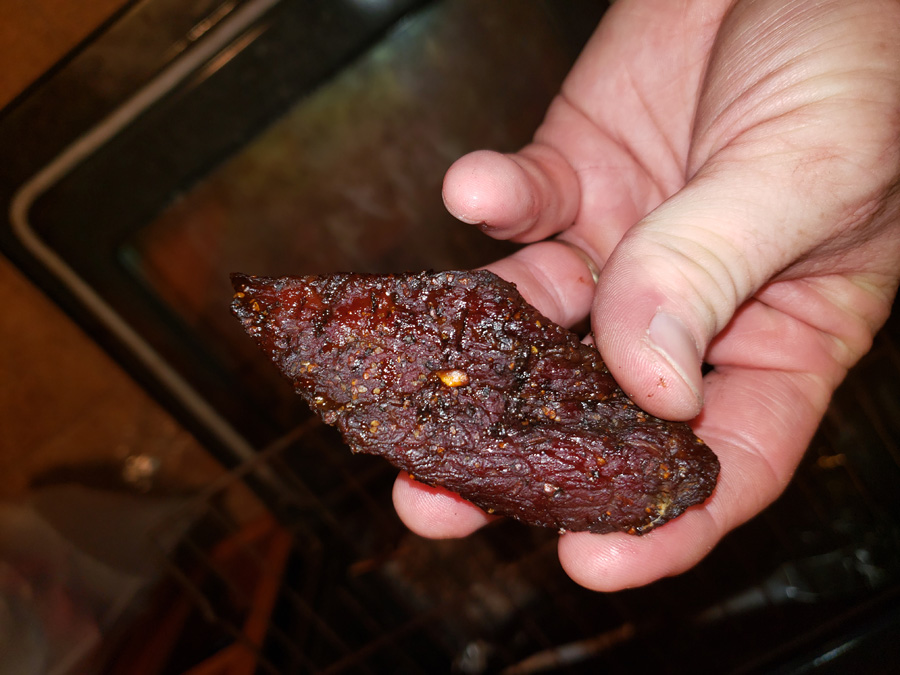
A finished piece of jerky.
Exactly how much you dry the jerky is up to you. Keep in mind that the more moisture you leave, the quicker the meat will spoil. However, if you dry it too much, you lose flavor and overall quality.
If you vacuum seal homemade jerky, it will last for anywhere from one to three months. If you refrigerate, it will last for a couple of weeks to perhaps a month. If you put it in ziplock bags and store it in the pantry at room temps, you're looking at a week or so. Three factors will accelerate spoilage of the jerky: fattier meat spoils quicker, higher moisture content spoils quicker, and certain marinade elements spoil quicker.
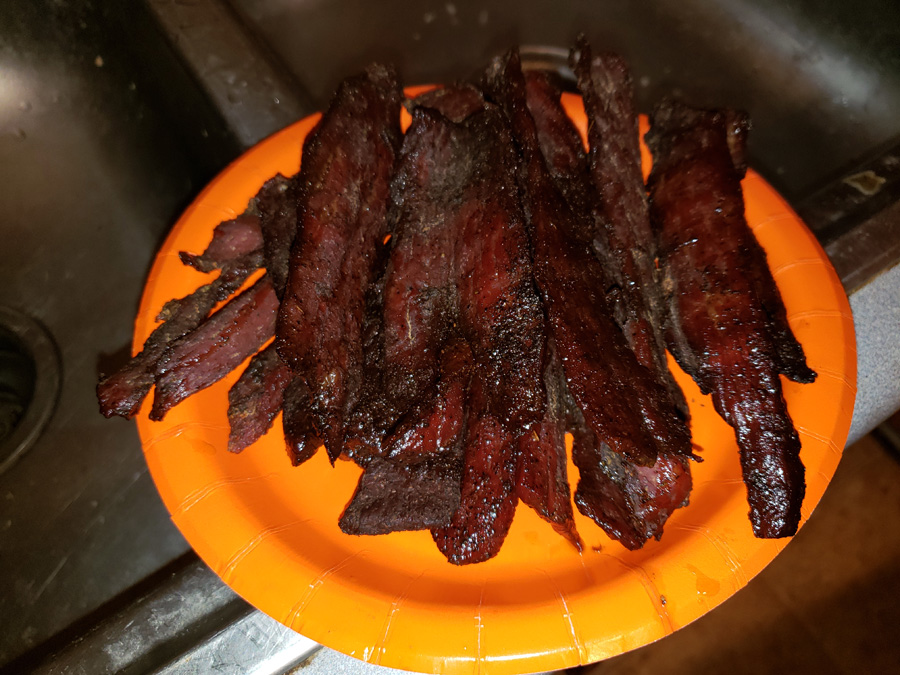
Yum!
Tags for this post: Cooking
Permalink
Please share this post!




If you enjoy HomeBrew Dad, please support the site by using my Amazon affiliate link when doing any shopping there. All prices are exactly the same, but HomeBrew Dad will receive a commission on your purchases. Thanks!
